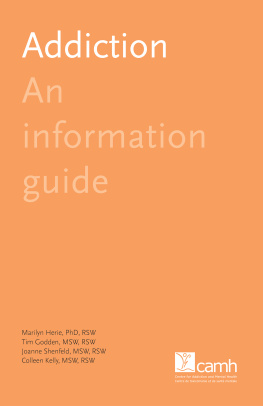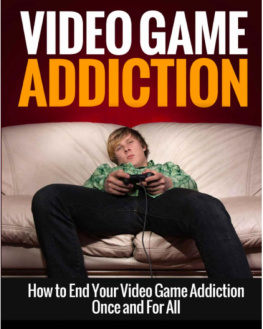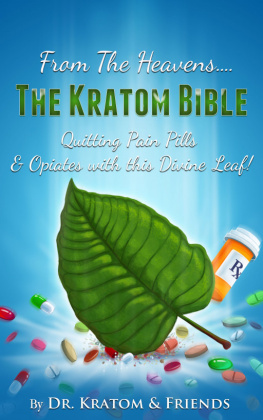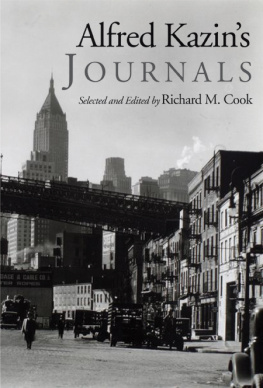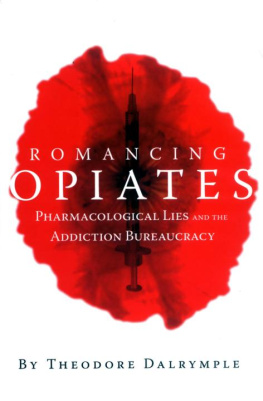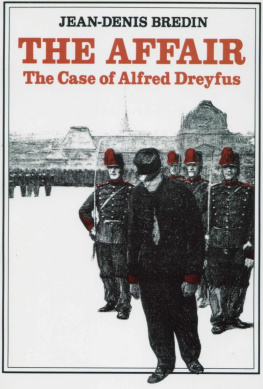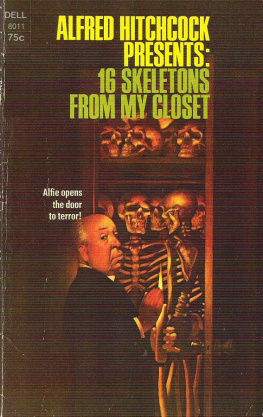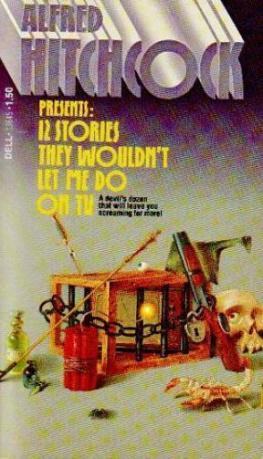Addiction & Opiates
Addiction & Opiates
Alfred R. Lindesmith
First published 1968 by Transaction Publishers
Published 2017 by Routledge
2 Park Square, Milton Park, Abingdon, Oxon OX14 4RN
711 Third Avenue, New York, NY 10017, USA
Routledge is an imprint of the Taylor & Francis, an informa business
Copyright 1968 by Taylor & Francis.
All rights reserved. No part of this book may be reprinted or reproduced or utilised in any form or by any electronic, mechanical, or other means, now known or hereafter invented, including photocopying and recording, or in any information storage or retrieval system, without permission in writing from the publishers.
Notice:
Product or corporate names may be trademarks or registered trademarks, and are used only for identification and explanation without intent to infringe.
Library of Congress Catalog Number: 2008002629
Library of Congress Cataloging-in-Publication Data
Lindesmith, Alfred Ray, 1905-1991.
Addiction and opiates / Alfred R. Lindesmith.
p.; cm.
Originally published: Chicago: Aldine, 1968.
Includes bibliographical references and index.
ISBN 978-0-202-36223-6 (alk. paper)
1. Opium abuse. 2. Narcotics. 3. Drug addiction. I. Title. [DNLM: 1. Opium. 2. SubstanceRelated Disorders. WM 286 L745a 1968a]
RC568.O6L5 2008
362.293dc22
2008002629
ISBN 13: 978-0-202-36223-6 (pbk)
This revision of my 1947 book, Opiate Addiction, has been prompted primarily by continued interest in and debate concerning the theory of addiction that was elaborated in it. The first part of the book, which presents a theoretical discussion of the social psychology of opiate addiction, has been extensively revised to incorporate new evidence and arguments, to make the theoretical position more clear, and to take negative criticisms into account.
The second part deals with the social problem of addiction and is relatively brief. Because I have analyzed the policy and problem aspects of addiction in some detail in my 1965 book, The Addict and the Law, I have simply reproduced my 1947 analysis with only a very few minor editorial changes and a brief postscript. The bibliography and the glossary of the addicts argot have been expanded and updated.
Contents
Part I
The Nature of the Opiate Habit
Chapter
Method and Problem
The present study is directly concerned only with addiction to the opiate-type drugs and their synthetic equivalents. A rational, general theoretical account of the nature of the experiences which generate the addicts characteristic craving for drugs is proposed and systematically elaborated. While this theoretical position has obvious implications for other addictions which resemble opiate addiction in that they also involve drugs which produce physical dependence and withdrawal distress, an extension of the theory to these other forms of addiction, such as alcoholism, is not attempted here. This is a matter which requires specific empirical investigation of a comparative nature.
The central theoretical problem of this investigation is posed by the fact that some persons who experience the effects of opiate-type drugs and use them for a period sufficient to establish physical dependence do not become addicts while others under what appear to be the same conditions do become addicted. The attempt to account for this differential reaction requires a specification of the circumstances under which physical dependence results in addiction and in the absence of which it does not. It also requires a careful consideration of the meaning of addiction spelled out in terms of behavior and attitudes characteristic of opiate addicts everywhere. The theory that is developed is a general one; its applicability is not limited to American addicts, to lower-class users, to twentieth-century addiction, to any restricted segment of the problem, or to any specific historical period. Consequently, the focus of theoretical attention must be on those aspects of addiction which may reasonably be regarded as basic or essential in the sense that they are invariably manifested by all types of addicts regardless of place, time, method of use, social class, and other similar variable circumstances.
The second part of the study consists of a brief statement of a view of current public policy concerning addiction in the United States, with proposals for reform which, it is believed, would substantially reduce the evils now associated with addiction and the large illicit traffic in drugs. Since the original publication of this book in 1947 there has been a widespread public realization that the American program of dealing with addicts is both cruel and ineffective and that it compares unfavorably in these respects with the programs of most European countries in which opiate addiction is handled primarily as a medical rather than as a police problem.
It should be kept in mind that when I use such terms as narcotics, drugs, drug addict, and drug users, I will be referring to drugs that are commonly classified as opiates and their synthetic equivalents and to persons addicted to drugs in this class. Common and well-known examples are opium, heroin, morphine, methadone, and demerol. Marihuana and cocaine do not belong to this category, and only incidental reference will be made to them. While alcohol is addicting in approximately the same sense that heroin is, it will also be referred to only incidentally. The fact that marihuana, cocaine, and heroin and other opiate-type drugs are covered in the same anti-narcotics legislation is a fertile source of confused thinking because it obscures the facts that the use of marihuana is totally unlike heroin or morphine addiction and that alcoholism, which is not covered by the legislation and is not popularly thought of as a form of narcotic addiction, actually has very much in common with opiate addiction.
The theory that is proposed in this book, in its earliest stages, was derived from observing addicts and conversing with them. The later development of the theoretical framework of the study was also significantly influenced by data available in the extensive literature. Approximately fifty addicts were interviewed over a fairly extended period of time sufficient to establish an informal, friendly relationship of mutual trust. In the case of twelve others there was at least one interview but the relationship was brief or occurred under circumstances that made it impossible to place much confidence in what was said or to obtain a full and consistent account of the persons addiction history. Since my contacts were usually with addicts who were using drugs it was unavoidable that some of them disappeared before I could learn much from them. On the other hand, there were some with whom I established relationships that lasted for several years covering periods of use, of temporary voluntary abstention, and of incarceration.
My principal assistance in becoming acquainted with new subjects came from Broadway Jones, officially known by the alias Chic Conwell, which Sutherland gave to him in The Professional Thief. Mr. Jones himself had had a long history of addiction that began in his late teens. He was an invaluable source of information. He also read and criticized my manuscript. Indeed,




